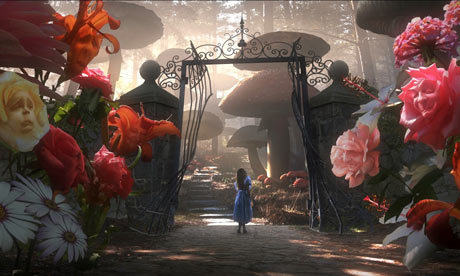
Tim Burton can expect some uncomfortable questions to be hurled at him as he strolls down the red carpet at the royal premiere of Alice in Wonderland in London tomorrow. In a scene that seems to have tumbled straight out of the pages of Lewis Carroll, the director's whimsical 3D extravaganza will be launched at the Odeon in Leicester Square – despite the fact that Odeon cinemas are boycotting the movie.
Burton's film has become an unlikely pawn in a global struggle to redefine how, when and where we watch movies in the digital age. Disney, which produced the movie, wants to shorten the amount of time between some films being released in cinemas and then coming out on DVD. Exhibitors, unsurprisingly, want to preserve the exclusive theatrical experience for as long as possible.
Two weeks ago, Odeon, Vue and Cineworld lined up shoulder to shoulder to boycott Alice in Wonderland after Disney declared its plan to release the DVD just three months after the theatrical opening on 5 March, instead of waiting the normal four months. But last week, Cineworld broke ranks to strike a compromise deal, and yesterday Vue followed suit, leaving Odeon, the biggest and most powerful chain, to stand alone. While Odeon has stated publicly that it won't book Alice, industry insiders say negotiations are continuing.
Disney is also attempting to impose the shorter theatrical window for Alice in the US, Italy, the Netherlands and Belgium. The studio insists that it's not trying to enforce a new industry standard: it simply wants the flexibility to release some films sooner on DVD, when it makes commercial sense to do so. The studio argues that films typically last about two months in cinemas before they disappear off screens; this means a further two-month wait until the official DVD release, a period used by pirates to flog illegal copies. A shorter window, says Disney, will mean less money lost to the pirates.
But exhibitors fear that if they accept a three-month window for Alice, rather than a four, then other studios will follow suit, making a further contraction inevitable. This, they say, will erode the eagerness of audiences to rush out to the cinema, and tempt them to wait instead for the DVD or online release.
The problem is: nobody knows. No proper research has been commissioned as to the optimum length of time between a cinema and DVD release. We do know, however, that cinema box office is booming. Why, in a time of economic turmoil, put that in peril?
The answer is that DVD, TV and, increasingly, online sales are where the studios make their profits. Except for the biggest hits, cinema screenings are a loss leader, or at best a break-even proposition that enables distributors to properly cash in further down the line. So, while audiences seem happy to flock to cinemas in ever greater numbers, the deflation of the home entertainment business, by piracy as well as other forces, makes it harder for the studios to afford the mountainous costs of production. That's why Hollywood is cutting its output and slashing staff.
Cinema chains don't have any direct stake in those later revenues. They're in the old-fashioned business of getting bums on seats, and selling them jumbo-sized popcorn at jumbo-sized prices. Despite their robust ticket sales, they are hurting from the collapse of cinema ad revenues. Until they turn their ticket-booking websites into online platforms for downloading movies – a business they are looking at – there's no obvious upside to shorter windows for them.
Still, it would be much more painful for UK cinemas than for Disney to forgo the full expected box office for Alice in Wonderland. Before this battle broke, cinemas were predicting that Alice would hit £40m: that's a much greater percentage of their annual takings than it is of Disney's global revenues. Then there's the Burton factor. He hasn't poked his tousled head out of his rabbit hole to comment, but, as a longtime UK resident, he can't be delighted about the situation. If Odeon still hasn't settled by the time Burton presents his film to Prince Charles tomorrow, the movie will be in the press for all the wrong reasons.
Sources say Disney's president, Bob Iger, is personally involved in the negotiations. "I have never seen anything like it in 20 years," confides one cinema boss. "They are desperate to get this sorted out, and my God did they underestimate what a fight this would be." Over the past year, Iger and his freshly appointed studio chairman, Rich Ross, have swept away every veteran executive bred in the old cinema distribution model and replaced them with people from home entertainment and TV, who are tasked with reinventing the way the studio does business for the digital age.
In the end, the question comes down to what we, the public, want. The old system of carefully staggered windows, even if the technology makes that unnecessary? Or the freedom to watch a movie at home on the first day of its cinema release – at the risk of closing half the cinemas in the country? As the head of one smaller UK chain, who immediately agreed to book Alice In Wonderland, says: "The customer is changing, the content is changing, and I'm not sure the film industry has caught up with this yet."

